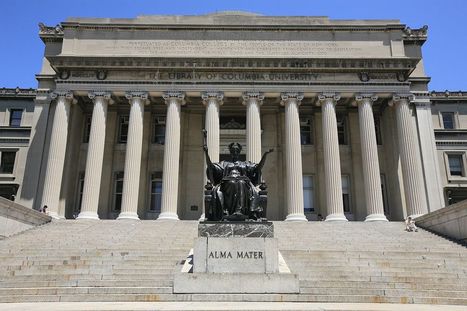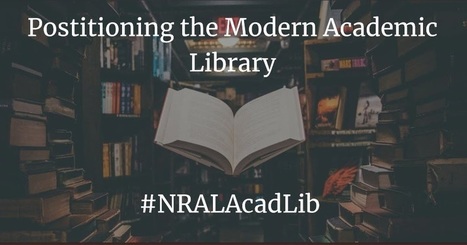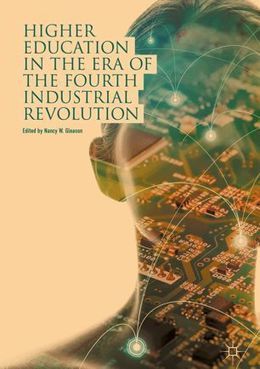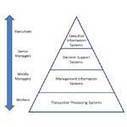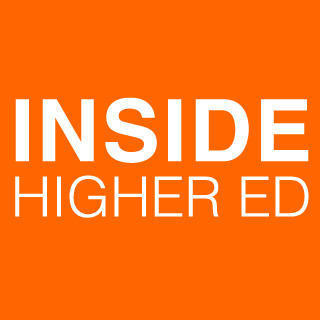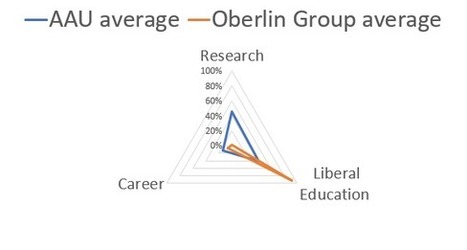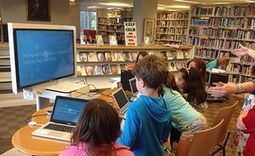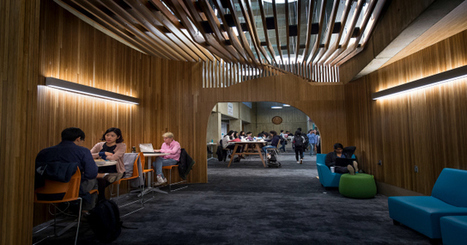 Your new post is loading...
 Your new post is loading...
The role of academic and research libraries as active participants and leaders in the production of scholarly research Research Libraries UK is delighted to publish the results of a major research project exploring the role, and potential role, of research and academic libraries as partners in, and leaders of, research. Commissioned by RLUK, in partnership with the Arts and Humanities Research Council (AHRC), and delivered by research consultancy Evidence Base, the report takes an inclusive definition of libraries, which includes archives, special collections, museums and galleries. The report provides a detailed overview of the current role of academic and research libraries as partners and leaders of research, their potential to enhance these roles, and the barriers they might face in doing so. The report has 10 headline findings and makes 13 far-reaching recommendations for libraries, members of the academic community, parent organisations, RLUK, and the AHRC. .
In 2017 Columbia Libraries took a closer look at ten of our largest external services, most of them delivered by for-profit vendors, to review the quality of these external web-based services. Web traffic to these services exceeds 7 million page views per year.
I spent the better part of two decades in campus IT, where it was typical to brand services with prominent, top-level University branding, write into contracts that vendor branding was to be removed from top-level pages, and change the design to more closely match Columbia web design guidelines. It was quite a surprise when I discovered that every one of the ten Library services that we reviewed lacked adequate University or Library branding.
According to experts, university libraries are changing—with the exception of one important role Universities are seeking ways to innovate and keep up with the changing expectations of students and faculty, and university libraries are no different. Academic libraries are good at adapting as they try to meet students and faculty who learn differently and who have varying expectations for what their university library is. As physical space, available funding, and student needs change, university libraries will have to adapt to meet different needs and campus roles.
Guest Post by Michelle Breen , Head of Information Services at the Glucksman Library at the University of Limerick . Things hav
In this chapter included in the book Higher Education in the Era of the Fourth Industrial Revolution, Dempsey and Malpas consider the future of the academic library in the context of a diversifying higher education system. The academic library is not fixed. It is changing as it adapts to the changing research and learning behaviors of its home institution, which are the principal drivers of the library service.
Dempsey and Malpas explore ways in which libraries are responding to the transition from a collections-based model to a more diffuse services-based model. This is in parallel with the evolving influence of the network on student, teacher and researcher practices and with the shift from print to digital. They describe diversification of the higher education system, around poles of research, liberal education and career preparation. Academic libraries similarly will diverge, with different service bundles depending on the type of educational institution they serve.
This means that the model of excellence for libraries also will need to be plural, based on strategic fit to the needs of the institution they serve and not on collection size or gate count.
Library science, or library information science (LIS), might conjure up hermits in musty, dark rooms, cataloging index cards into towering file cabinets. But, that image is incorrect today, as library science now pertains to digital cataloging, social networking and a changing history in archival science. This list of 50 excellent library science blogs are worth reading for any contemporary library science professional.
Dive Brief:
As books gave way to digital sources of information instantly accessible from anywhere, school libraries and librarians were put under pressure to reinvent themselves, according to eSchool News.
School librarians are still supporting reading, writing and research skills, but with a co-focus on digital literacy as well.
The digital workshop is one 21st century learning opportunity that school librarians are implementing. Students learn coding and valuable social skills, including teamwork.
Last month a publication called 24/7 Wall St. published an article titled “America’s 25 Dying Industries.” Using data from the Bureau of Labor Statistics, the article analyzed how employment levels in various sectors changed between 2007 and 2016.
The article, which was recently republished by USA Today, Yahoo Finance and many others, ranked libraries and archives as one of the fastest-declining industries in the U.S., second only to video tape and disc rental. The publication of the article prompted a strong response from librarians, who questioned the validity of the analysis.
Spreading digital fluency is now a core responsibility of academic libraries, and Artificial Intelligence and the Internet of Things (IoT) are poised to amplify the utility and reach of library services like never before. These are just two of the revelations part of the New Media Consortium’s (NMC) University of Applied Sciences (HTW) Chur, Technische Informationsbibliothek (TIB), ETH Library, and the Association of College & Research Libraries’ (ACRL) Annual Horizon Report: 2017 Library Edition.
We’ve been exploring if libraries could be part of building a better, fairer internet for us all.
Doteveryone believes we need neutral, non-commercial, community spaces for discovery, learning and existing in the digital age. We also believe libraries are a vital public institution, and provide vital social infrastructure, worth saving. (Libraries are public institutions that stand for a set of values. They are one of the few places left where you are a resident — or a person — before you are a consumer. We didn’t want to get nostalgic about libraries but when things are closed down and taken away, it is a lot harder to bring them back.)
Speaking at the Educause Annual Conference last month, Chris Bourg, director of libraries at the Massachusetts Institute of Technology, said something that seemed to resonate with her audience.
“I don’t think we need to save libraries, but I do think we might need libraries to save us,” Bourg said.
On Monday I gave a talk on MOOCs, Information Literacy and the role of the librarian at Edinburgh university on. The abstract for this was "Sheila Webber will start by briefly outlining some general characteristics of MOOCs and her own experience with them. She will go on to identify types of MOOC and the implications for MOOC pedagogy. As part of this discussion she will note some findings from an investigation into the value of learning analytics for MOOC educators (undertaken by Naomi Colhoun at Sheffield University in summer 2014). In the final part of her presentation she will reflect on the various roles that have been, or could be, adopted by librarians."
Library directors and administrators at all types of colleges and universities agree their libraries should teach undergraduates research skills and information literacy, but the Ithaka S+R Library Survey 2013 also suggests libraries are increasingly tailoring their services to address institutional needs. Ithaka, a nonprofit research organization that promotes innovative forms of teaching and scholarly communication, previously surveyed library directors in 2010. That survey captured libraries in the middle of a difficult transition from print to electronic resources. Based on the responses of 499 institutions in the fall 2013 survey, that shift has been, “from a budget allocation perspective, nearly completed.”
|
Libraries and learning resources services have embraced digital practice over three decades. Lis Parcell reflects on their pioneering approach and considers how libraries will continue to reinvent themselves
In a vibrant, multicultural society, representing the richness of students’ lives in a class or school library takes a conscious effort. Including writers and fictional characters with a variety of backgrounds, beliefs, and life circumstances is a way to increase the chances that students will find both windows and mirrors in the library—books that reflect their lives, and ones that give them insight into the lives and experiences of people who aren’t like them.
While the role of the library has evolved to provide services from internet access to journalism programmes, countless libraries still face closure, as civic leaders fail to recognise the critical social, intellectual, cultural, and economic roles they play
"Why are they coming?" a new colleague asked me earnestly. She was wondering why students are coming to visit our university library in the digital age. If we understood the answer to this question, could we prepare more wisely for the future of the IT and library professions? Indeed, there is reason to be curious. At the University of Miami Libraries, for instance, the number of people entering our largest library, Otto G. Richter Library, has risen approximately 20 percent since 2015. During peak periods, such as final exams, the number of students entering often exceeds seating capacity. Our students advise incoming peers that the best place to study is the library, and they are acting on these recommendations by visiting in person and staying for many hours at a time.1 But the students who visit our library are not entirely satisfied with what they are finding. When asked what needs to be improved, students request more seats, more power outlets, and longer hours. These requests might be understood not just literally but also philosophically: students seem to want a library that is more capacious, connected, and open.
Libraries become a different kind of learning destination when schools reimagine them as open, transparent spaces that invite student communication and collaboration.
In many respects, today’s campus library bears little resemblance to the quiet, book-filled building of years past. But that doesn’t mean libraries — and their custodians of knowledge — are on the margins when it comes to educating students. Many institutions are finding new tools and new strategies to help libraries stay relevant in the digital landscape.
In higher education, 21st-century librarians are seeing a redefinition of their roles, moving from stewards of physical information to educators on digital literacy. Institutions are also taking a new look at library buildings, which are becoming less about offering a refuge for quiet, independent study and more about creating opportunities for creativity and collaboration.
Yesterday Carnegie Mellon University announced a new partnership with technology company Digital Science. CMU’s Keith Webster describes the mutual commitment to research discovery and smarter workflows that underpins this collaboration, and also outlines some of the ways in which academic libraries have changed; from their more dynamic use of space to the redeveloped tools and services made available to students and researchers looking to navigate the vast information landscape.
The National Student Survey and the teaching excellence framework are placing growing emphasis on the learning environment and student experience. But discussions have moved on from thinking about physical spaces. Instead, libraries are putting digital innovation at the top of their lists.
Any revamped digital approach to libraries needs to begin by considering how student expectations vary. While hard copies of core texts will likely have a place on the library shelves for years to come, the way students consume and digest information is changing.
A new report has been published by ACRL: Academic Library Impact on Student Learning and Success: Findings from Assessment in Action Team Projects.
A new report from ACRL spells out the findings of a massive student learning assessment project. I still have some questions.
There’s a new report out from the Association of College and Research Libraries summarizing the findings of the second year of a project called Assessment in Action, an ambitious attempt involving over 200 institutions to see how libraries contribute to student learning and how we can measure that contribution. (A report on findings from the first year of this project is also available. I’m just late catching up on my reading.) The librarians involved in this massive project offer a trove of ideas about how we can assess a library’s contributions to learning, and it’s all available online, including survey instruments, rubrics, and more. Each team devised their own question to focus on, one that reflected institutional goals, and summaries of what they learned are available in a searchable database. If you’re a librarian doing assessment of learning, this is an amazing resource.
The other day, I bumped into an article in which some pundit was solving the problems of higher education. Unfortunately, I can’t link to it because it was one of those “nothing to see here, move along” moments. But one phrase from the article stuck like a burr. The pundit seemed to assume that “content delivery” was to a large extent the purpose of courses and majors, and that the problem we need to solve is delivering content more effectively and efficiently, which seems to me completely wrong.
|



 Your new post is loading...
Your new post is loading...


